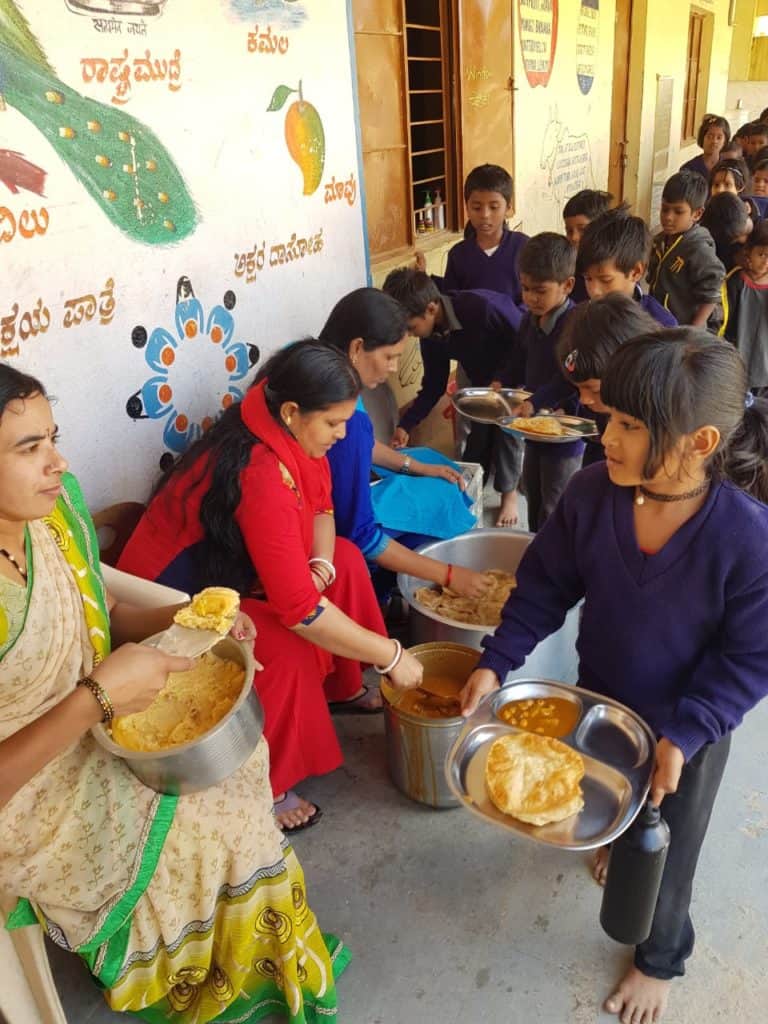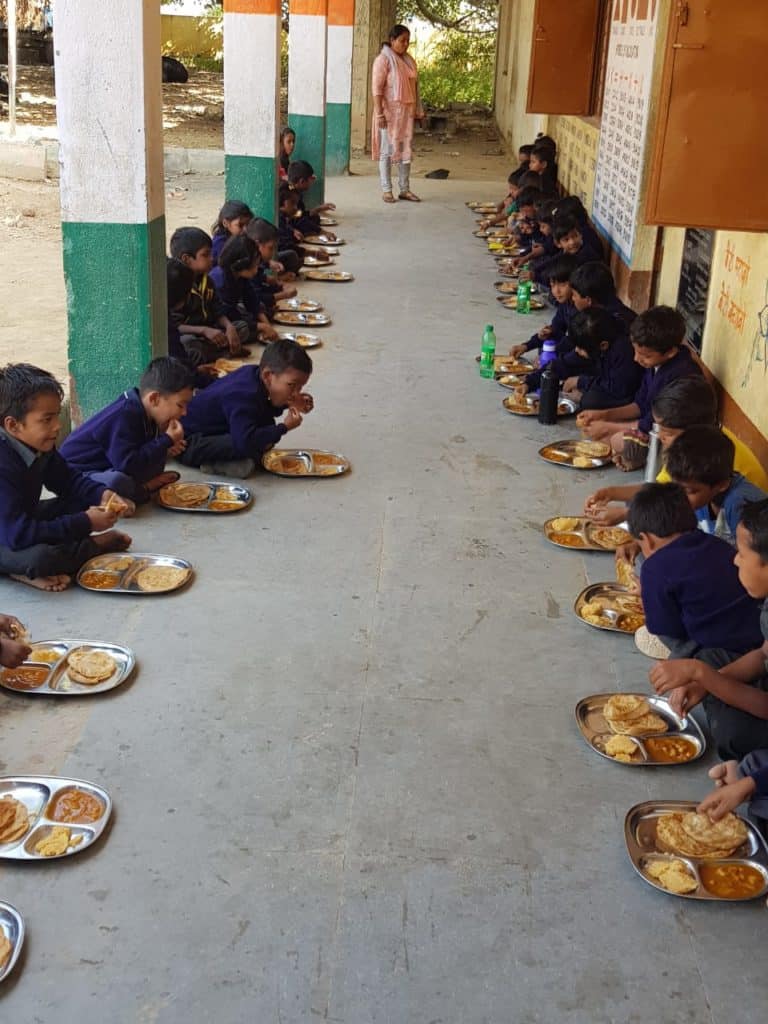In a world where we produce enough food to feed everyone, 821 million people – one in nine – still go to bed on an empty stomach every night. Even more — one in three – suffer from some form of malnutrition.
Inspired by Sarabjeet Singh of Shimla, I thought of starting something similar on a very small scale in our residential society, Akme Encore, in Kundalahalli.
I sent out a video of Sarabjeet’s work on our community WhatsApp group and called for volunteers. Around 6-7 people came forward but we were clueless about what to do next.
To gain some clarity, I started talking to a few NGOs. Fortunately, within a day or two, I was able to connect with Mom Banerjee, the founder of Samridhdhi Trust. She happens to be a resident of Akme Encore.
Learning on empty stomachs
Samridhdhi Trust is a network of no-fee bridge schools that give basic education to out-of-school children of migrant labourers in a multi-level (pre-kg, class 1 – 10) and multilingual atmosphere. Back in mid-2018, the Trust was struggling for funds for the children’s breakfast.
The children used to come hungry to school. Teachers and volunteers noticed that they were not able to concentrate on their lessons due to this. I shared a plan with Mom Banerjee and she was all in favour of starting a breakfast programme for their school at Nallurahalli.
Read more: Here’s how you can donate food in Bengaluru
It was as if destiny had planned our meeting, because Mom had been looking for someone to sponsor breakfast for kids and we at Akme Encore were looking for a place where we could start our food-sharing effort. And the irony is that we stay in same residential complex, same building and same floor, right next to each other, but hadn’t talked to each other earlier.
Simple, healthy food
We at Akme had initially planned to support 2-3 kids each. Mom came with a larger requirement. People were sceptical because they had full-time jobs, kids and other daily chores. It looked difficult. Mom and I then came up with an easy-to-cook and healthy menu:
| Monday | 12 bananas and 1 loaf of bread-jam sandwiches |
| Tuesday | Poha with curd |
| Wednesday | Cornflakes with milk |
| Thursday | 12 boiled eggs and 1 loaf of bread-butter sandwiches |
| Friday | Boiled brown chana with onions and tomatoes given as add-on |
| Saturday | Milk with biscuits |
The menu was easy and didn’t require extra effort even with increase in number of kids. Some children would bring their younger siblings to school, and there was always enough to feed them too.
We circulated the menu amongst volunteers and it was accepted by one and all. After the menu was circulated, five more members joined the group and each one as of today is sending food for 6-8 kids without any issues. This is how Akme Ahaar — our breakfast programme — was conceptualised.
Making a difference
When the pandemic arrived, we were 20 volunteers, together sending breakfast for 120 kids. Our team comprises of Neha, Atreyee, Seeta, Mom, Deepika, Deepa,Manasi, Nisha, Aaskiran, Arunima, Ramya, Reema, Shruti, Swati, Rolly, Ruchika, Shikha, Shilpi, Swagatika and Sonal.
We dropped off the tiffin boxes at the society main gate by 8 am. Samriddhi’s van came to collect the food at around 8:30 am. Washed Tiffin boxes were dropped back by 4 pm at the society gate.

The volunteers own this project and are ready to help each other all the time. We have some amazing people as volunteers who do not hesitate to go beyond their set responsibility.
We have had volunteers go on vacation and we have also had volunteers who have not been able to make food due to personal reasons for short periods of time. In such instances, the rest of the volunteers step up and cook the extra food needed to compensate for the volunteers who are not able to contribute.
We have had to stop the breakfast programme due to COVID-19, but continued it in a different form. We provided food and groceries for the children’s families that stayed back during the lockdown. Most families left. We provided groceries and food packets to them too.
Now with things getting back to normal, we are hoping to resume our breakfast programme once schools start.
It’s a wonderful feeling to be able to do something for someone. We often procrastinate looking at the massive scale of problems and think that our effort alone will not eradicate it. We all can make a difference in at least one person’s life.
This reminds me of a story which motivates me each time I feel daunted by the scale of problems and the minimal impact I am able to create.
A young girl was walking along a beach upon which thousands of starfish had been washed up during a terrible storm. When she came to each starfish, she would pick it up, and throw it back into the ocean. People watched her with amusement.
She had been doing this for some time when a man approached her and said, “Little girl, why are you doing this? Look at this beach! You can’t save all these starfish. You can’t begin to make a difference!”
The girl seemed crushed, suddenly deflated. But after a few moments, she bent down, picked up another starfish, and hurled it as far as she could into the ocean. Then she looked up at the man and replied, “Well, I made a difference to that one!”

Also read:
- Reduced syllabus not enough help for govt school students
- Unused materials in your home can help B’luru kids get back to school: An eco-group shows how
- Learnings from a month-long lockdown: How to deliver food and essentials to citizens
- Delhi: Kids go hungry even as foodgrains rot in overflowing godowns
It is a great initiative and I am so happy to see that if one has a will to do they will always find a way and this is a great example of the same. Kudos to all the Volunteers, you all are doing great and setting a great example for all of us. Thanks a lot! And Thanks for sharing Deepika!